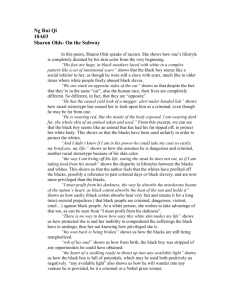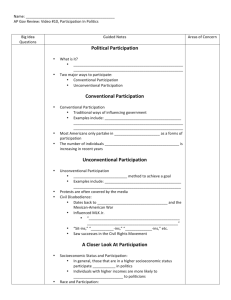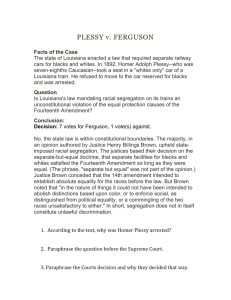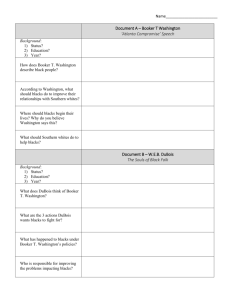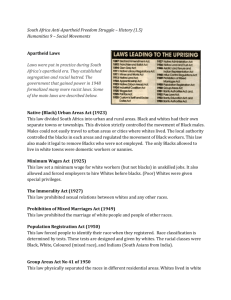final_document-_precaculus
advertisement
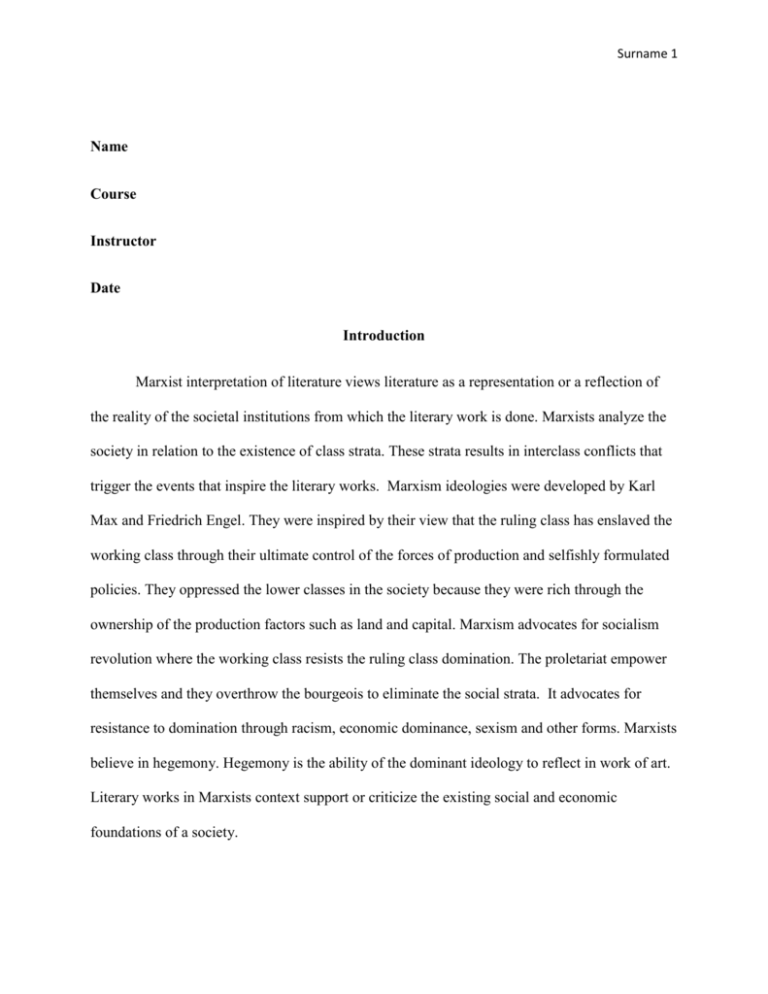
Surname 1 Name Course Instructor Date Introduction Marxist interpretation of literature views literature as a representation or a reflection of the reality of the societal institutions from which the literary work is done. Marxists analyze the society in relation to the existence of class strata. These strata results in interclass conflicts that trigger the events that inspire the literary works. Marxism ideologies were developed by Karl Max and Friedrich Engel. They were inspired by their view that the ruling class has enslaved the working class through their ultimate control of the forces of production and selfishly formulated policies. They oppressed the lower classes in the society because they were rich through the ownership of the production factors such as land and capital. Marxism advocates for socialism revolution where the working class resists the ruling class domination. The proletariat empower themselves and they overthrow the bourgeois to eliminate the social strata. It advocates for resistance to domination through racism, economic dominance, sexism and other forms. Marxists believe in hegemony. Hegemony is the ability of the dominant ideology to reflect in work of art. Literary works in Marxists context support or criticize the existing social and economic foundations of a society. Surname 2 This paper presents an analysis of Black Boy, Native Son, and Uncle Toms Children by Richard Wright and Invisible Man by Ralph Ellison. It is presents the Marxist ideologies and how it manifests in the above books. Ralph Ellison and Richard Wright wrote their work during the time of communism. It is reflected in their choice of words, characters, stylistic devices and overall plot. This paper presents the theme of economic impoverishment, class conflict and pursuit for power and access as presented in the stories by the two authors. Economic impoverishment Economic impoverishment is the state of having little or no money and material possession. Impoverishment means that the poor characters are deliberately made poor for a particular purpose. The books are written in the context of racial segregation. The whites are the capital owners and they are viewed as a superior race than the blacks. The whites oppress the blacks economically so that they can maintain their control over the blacks. A Native Son is the story of a black young man called bigger Thomas. Economic impoverishment is prevalent in the story. Bigger lives with his family in the Southern Chicago. It is an area that is designated for the poor blacks. It is the only place where they can afford residence. Bigger lives in a one room house with his mother, sister and brother. They are so poor that their house is even rat infested. At the beginning, Bigger kills a rat that scares his mother and sister. Biggers mother is uneducated because she could not afford to go to school. She struggles to take her children to school but they do not go far in the school as bigger drops out. The sister is in an informal school where she is learning how to sew. Their mother is very poor that she cannot afford to pay the $8 required for the rent. The blacks live in houses that are owned and controlled by the white people. The whites are always increasing the cost of rent and other basic Surname 3 facilities in the southern Chicago. They push the poor blacks further into poverty with their actions. Biggers family depends on relief food to survive. At some point the mother insists to bigger that he should go out and get a job because she is worried that the relief mu be discontinued. If it is discontinued, she and her children may starve because it is their only way of getting food. Poverty pushes bigger to join a gang whose main activity is to steal. One time when they meet, bigger says he wishes to be an aviator. His friend Gus laughs at him and tells him that if he was not a black person and he had money, then he could be allowed into aviation school and he could fly a plane. Bigger thinks about his friends comment and they laugh together. It indicates that both of them think that it is an unachievable dream and they have resigned to their poverty fate. Bigger ends up as a chauffeur for the Daltons, a white family. Biggers life is a demonstration of the viscous cycle of poverty as it occurs among the blacks. The Daltons are part of the whites who oppress the poor blacks. They are one of the owners of the housing in the south Chicago. They pretend to be philanthropist to cover up their economic oppression acts. They whites in this story ensure that they have resource power and they accumulate it by exploiting the poor. They deny the poor blacks the power they need to break out of the viscous cycle of poverty. Uncle Toms Children is a collection of stories. The theme of poverty is also prevalent in this book. In the Ethics of Jim Crow, Wright, the narrator`s roots are in the poor southern neighborhood. The system does not allow the black men to get good position at the work place. They are accorded the lowly positions because they are viewed as inferior in the presence of the whites. He works as a bell boy in a hotel where the blacks are openly oppressed by the whites. A black man works in the presence of white prostitutes and he is not allowed to touch or look at them. Sleeping with a white prostitute would result in castration. The whites on the other and are Surname 4 allowed to even rape their black maids. This oppression is symbolic economically. It shows that the white cannot tolerate the black’s ownership of resources and they place bottlenecks that prevent the blacks from prospering. The whites on the other hand are allowed to exploit the resources in any way they deem suitable to them for their economic satisfaction. It results in a great economic gap between the blacks and the whites. The blacks are pushed into greater poverty while the whites are economically empowered continuously. In the story Down by the Riverside, the floods require Mann to evict his family form the lowlands to the hills. Mann cannot afford a boat and he has to sell his donkey to get some money. His wife goes into labor while on the boat. When he asks for help, he is shot at. He takes his wife to a Red Cross hospital because it is the only place he can afford. His wife is pronounced dead at the hospital and her body is taken away. The blacks in this story live in the lowlands while the whites live in the highlands. This is an indication that the whites are superior to the blacks. Mann is taking care of his family and, other in law, to show that even the parents are poor. Economic impoverishment is a cycle from one generation of blacks to the next. When a black person asks for help, the white people respond with hostility. The blacks remain poorer as the white prospers. In the Long Black Song, Sarah is married to silas and they have a baby. When the baby cries, Sarah gives her and old clock to play with because it is the only toy she can afford. This is symbolic in that economic impoverishment is generational. Parents give their children only what they can afford. The children also respond in a similar way to the generations to come. When the white man sells his wares to her, she refuses because they cannot afford. The money Silas gets form the farm; he uses it to buy more land. The white man assures her that payment can be done in installments. When she sleeps with him, he gives her a discount on the clock. In the fire and cloud, reverend Taylor is wondering what to do to ensure maintain a good relationship with the whites. The Surname 5 whites provide him with relief food which he uses to feed his congregation. He knows that if he rubs shoulders in the wrong way with the blacks, they will cut the relief and his people will starve. The communists advocate for equality in the society. They are planning to march against oppression and they need reverend Taylor to endorse their plan so that they can attract more participants in order to have the effect they desire. Taylor is confused about what to do because he does not want to offend the whites directly for the sake of his people. When Taylor is mistreated by the sheriff and his people, he joins the communist and they stage a successful march that involves both the white and black participants. Black boy is the story of Richard Wright. He was born and bred in a poor environment. In the story, Richard and his family move from place to place in search of a way to meet their basic needs. They lack food because they are poor. His father runs to another woman because he cannot withstand the poor conditions of Richards’s family. Richard is inspired by the desire to live a better life and he learns how to write. He overcomes all societal obstacles to be a good writer. However, his relative and the society do not believe in the success of a black man. His grandmother and his aunt harass him to do things their way by abandoning the writing obsession for religion but he refuses. At the work place he is fired for his good skills. In Black Boy, economic impoverishment is not only a result of white oppression but a belief among the blacks. Towards the end of the text, Wright is discouraged by the fact that writing is not helping him to connect with the world to relive him o poverty and other effects racial oppression. In the Invisible Man, is written by Ralph Ellison. The narrator lives in the south just like many other characters in Richard wrights works. The south is a poor neighborhood where blacks live. The narrator has public speaking skills and he is invited to present to a group of whites. He does it so well that they offer him a scholarship. Before they hand the scholarship to him he goes Surname 6 through humiliation together with other black men. He is poor and the humiliation is the price for him to get a college education. At the college he is caught in the wrong by the president and he is expelled. He goes back to his state of hopelessness and poverty. He says that he finds himself in a state on nakedness and helplessness in the modern city of plain, New York City. The recommendation letter he got from college bears discrediting information about him. It makes it difficult for him to get a job. When he lives the hospital, he goes to Harlem, a poor neighborhood of blacks. He is driven by the eviction of the poor elderly couple to give a speech against oppression. The speech earns his a position in the brotherhood. In this story, the blacks are portrayed as economically impoverished due to the oppressive acts of the whites. They are offered help but very few can bear the humiliation that come with the help. It enlarges the gap between the poor and the rich. The white put bottle necks for the poor blacks in their quest for success. They give them false hopes to avoid chaos from riots. The letter the narrator receives acts as a deliberate hindrance to his success. The whites need the blacks to remain economically weak to maintain their superiority in the society. Theme of class conflict Class conflict is a major theme in all the stories. It occurs when the oppressed struggle to break away from their oppression. As they work hard to be free, the oppressor works to maintain his superior position. The oppressor uses the resource power he possesses to continually oppress the poor man and to ensure that he does not gather the power to displace him from the powerful position. In the Native Sons, there is a communist party whose purpose is to free the poor blacks from the white oppression. Some whites such as Max are members of the communist party. They Surname 7 associate with the blacks to demonstrate socialism which they advocate for. Bigger and his friends plan to rob a white as a way of earning their daily bread and to demonstrate power. The whites are portrayed as rich and cultured while the blacks are portrayed as impoverished and lowly servants. When Bigger is apprehended for murder, his lawyer seeks justice for his case but the jury is determined on sentencing him to murder. The blacks use unity to overcome oppression while the white manipulate the social systems and structures to retain the power. In the Ethics Of Jim Crow, the rich are allowed to exploit the resource available in the society for their selfish gain while the poor are oppressed and the justice system is used o oppress them further. For instance, when a black man sleeps with a white prostitute the punitive measure is to castrate him while a white man goes scot free for sleeping with his maid. In the big boy leaves home, the gun struggle between big boy and the pool owner is symbolic of class struggle. The big boy represents the poor and the pool owner, the rich. They are fighting for a resource, the pool, which the white man owns. Instead of using it for the good of everyone the pool owner uses it selfishly and will kill to protect it. It shows that the white rich people will do anything to keep the resources from the blacks. The blacks are struggling to keep their lives rather than the resources that will empower them and this further pushes them into impoverishment. In the Fire and Cloud, presence of a communist party is an indication of existing class conflict. The communist party was established in places where class conflict occurred in order to push for equality. The communist have realized that together they can eliminate oppression by the rich. They believe that united they will stand and they seek the endorsement of reverend Taylor. His endorsement will influence more people to join the march against oppression. Eventually, reverend Taylor joins in the march for equality in the society. This story is a demonstration that the success of the class struggle against oppression can only be Surname 8 realized through unity. In a bright and morning star, the characters Sue and her sons and the communist party members represent the blacks who are in conflict with the white rich oppressors. The sheriff represents the oppressing class. Sue does her best to protect the communists who are planning against the oppression by the whites. The whites on the other hand use the social system, the sheriff’s office, to safeguard their interests. Sue and her son die protecting the communists and protesting against oppression. To Sue this is a worthy sacrifice. In the Invisible Man, the black is forced to play by the rules of the white man. The brotherhood is a movement that has emerged to push against the oppression of the poor black people. The white men give the black men access power and they snatch it away from them to ensure they are not empowered to overcome the. For instance, the narrator was given a scholarship to college and the president of the college expelled him giving him false hopes of a future at the school. In the story the narrator says he is underground and invisible but time has come for him to emerge and be visible. It symbolizes that time has come for the black people to rise and fight for recognition in the society. In Black Boy, class conflict is portrayed in the life of Wright. He says, "I wanted to understand these two sets of people who lived side by side and never touched, except in violence"(47). The white and the black are in a constant conflict as the blacks struggle to be free from oppression while the fights want to maintain their power. The black need a society of equality and the whites need the blacks to remain powerless so that they can have power over them. When Wright experiences political awakening in his communist party, he says that him and other like minded whites and blacks formed a disciplined, class conscious group that expressed the needs of the members and the communities they represented. Through collective Surname 9 action, they were able to show the world the plight of the black boys as a way of protesting the treatment of the poor by the rich people. Theme of pursuit for power and access In a native son, Biggers mother insists on him to get a job for them to get more resource power to live a better life. The Daltons are termed as philanthropist. According to Wright, the philanthropic acts were cover up for their exploitative actions. They owned houses in the south where the poor people lived and they were part of the scheme that oppressed through high rent. The philanthropic act is used to advance their power in an undetected manner. In Ethics of Jim Crow, Wright chooses his words carefully while talking with the white man. He knows that any word even thank you can be used against him. He struggles to maintain the politeness to ensure that he keeps his job and he does not get into trouble with the white man. Big boy chooses to escape from his community after he kills the white man. He knows that the whites will kill him if they catch up with him. He waits in a hole despite the thoughts that snakes could be hiding in the hole too. He successfully boards the lorry that gives him access to life away from the whites who are after his blood. Mann is determined this to take his family to a safe place. He sells his donkey because he does not have enough money to buy a boat. His pursuit for access to safety results in the death of a white man. Silas pursues power over a white man who he suspects has slept with his wife, Sarah. He beats up his wife and the white man. The white people pursue and lynch him for killing the white sales man. Silas also pursues resource power when he sells his farm products and buys a piece of land. In the fire and cloud, the communists pursue recognition and equality in their community. They stage a march for the poor Surname 10 people to demonstrate against exploitation by the rich members of the community. Sue is determined to pursue equality through protecting the communist plans. She is beaten up by the sheriff for talking back at him. She is determined to fulfill her course and when she recognizes the spy in the communist party she goes after his blood. She dies protecting the interests of the communists. In the invisible man, the narrator has lived his life pursuing access to recognition and resource power for his people. He uses his oratory skills to strengthen the brotherhood but the internal wrangles render his effort futile. He lives in the underground but he says in prologue 1 that it is time for him to rise. He steals electrical power from Monopolated Light & Power. He says that it gives him a sense of liveliness. He fells even with the Monopolated Light and Power that exploited him when he was powerless. He feels that he has gathered enough power and it is time for him to rise and be recognized. In the black boy, Wright dreams of being a writer. He visualizes himself as a northerner through his works. He thinks that his literary works will give him access to the things he desires and a better life. He comes from a poor and hostile background and his education is interrupted. He shuts himself from the obstacles created by the society to become a successful writer. His insatiable hunger for knowledge is his driving force. In conclusion, the Marxists advocate for a society founded on equality. all form of discriminations are condemned in the Marxist perspective. These books play a critical role in showing the effects of class division and racism in the American society during the times of Wright and Ellison. They have effectively portrayed the plight of the poor in an unequal society. Surname 11 These works are effective in mending racial relations universally because any society can relate to them. They advance the communist ideologies because the authors were communist. n Surname 12 Works Cited Ellison, Ralph. Invisible Man. New York: Vintage International, 1995. Print. Levy, Debbie. Richard Wright: A Biography. Minneapolis, Minn: Twenty-First Century Books, 2008. Print. Wright, Richard. Black Boy: A Record of Childhood and Youth. New York: Harper & Bros, 1945. Print. Wright, Richard. Native Son. New York: Harper & Bros, 1940. Print. Wright, Richard. Uncle Tom's Children, Five Long Stories. New York: Harper, 1938. Print.
